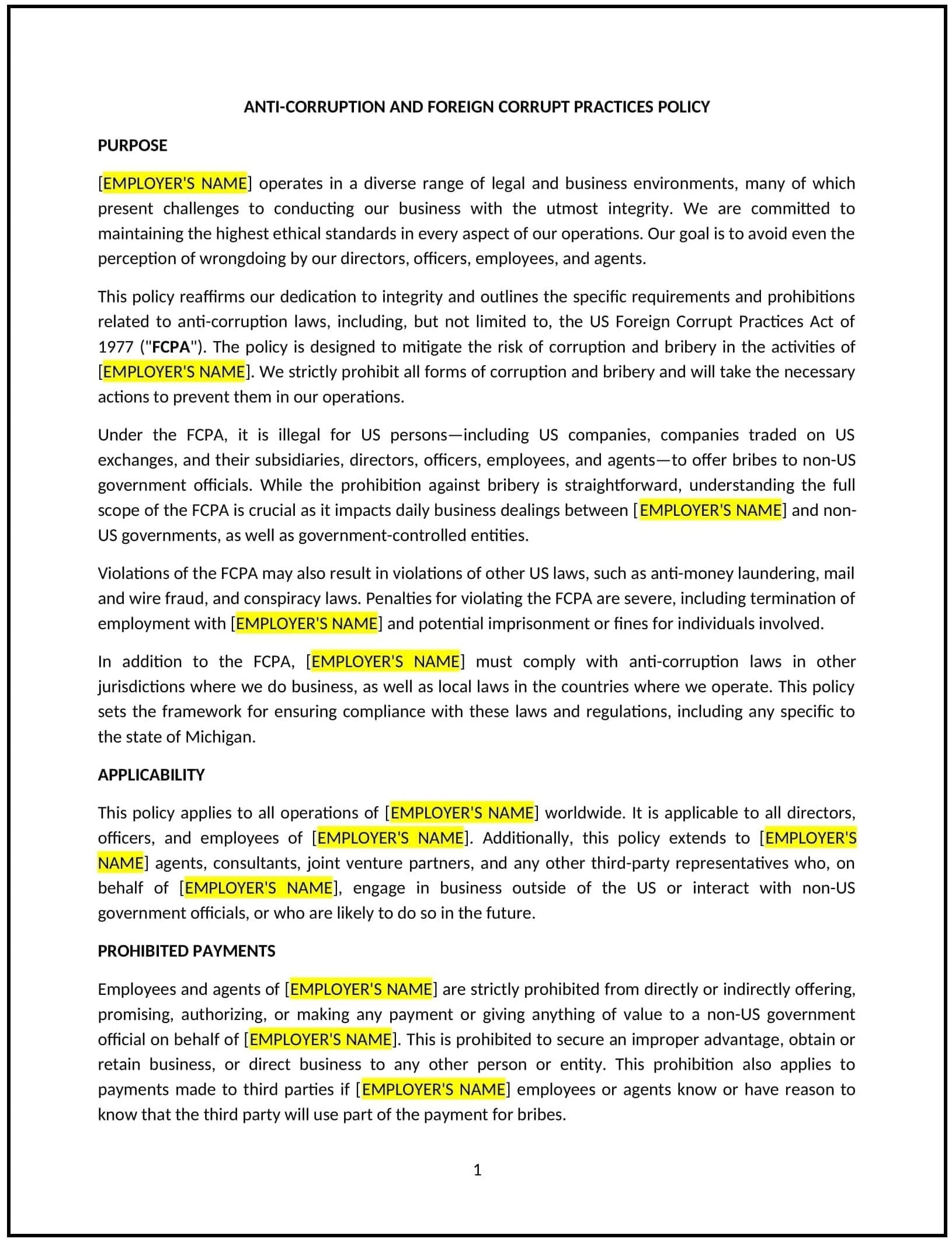Anti-corruption and foreign corrupt practices policy (Michigan): Free template
Got contracts to review? While you're here for policies, let Cobrief make contract review effortless—start your free review now.

Customize this template for free
Anti-corruption and foreign corrupt practices policy (Michigan)
An anti-corruption and foreign corrupt practices policy provides Michigan businesses with guidelines to prevent corrupt practices and comply with anti-bribery laws. This policy ensures that employees, contractors, and third parties adhere to ethical standards and avoid engaging in any form of corruption or bribery, both domestically and internationally.
By adopting this policy, businesses can maintain a reputation for integrity, reduce legal risks, and ensure compliance with both Michigan state and federal regulations.
How to use this anti-corruption and foreign corrupt practices policy (Michigan)
- Define prohibited practices: Clearly outline what constitutes corruption and bribery, including the offering, accepting, or soliciting of bribes, kickbacks, or other improper advantages.
- Set expectations for conduct: Emphasize that all employees, contractors, and third parties must act with integrity, transparency, and honesty in all business dealings.
- Address compliance with laws: Ensure the policy aligns with federal regulations such as the Foreign Corrupt Practices Act (FCPA), as well as Michigan state laws governing anti-corruption.
- Outline reporting procedures: Provide clear instructions for employees to report suspected violations of the policy, with guarantees of confidentiality and protection against retaliation.
- Specify gifts and entertainment guidelines: Set limits or prohibitions on gifts, entertainment, or other favors that could be perceived as attempts to influence business decisions.
- Include third-party oversight: Explain the process for vetting and monitoring third parties, such as suppliers, agents, and business partners, to ensure they comply with anti-corruption standards.
- Define consequences: Clearly state the disciplinary actions that may be taken against employees or third parties who violate the policy, including termination or legal action.
Benefits of using this anti-corruption and foreign corrupt practices policy (Michigan)
This policy provides several key benefits for Michigan businesses:
- Enhances reputation: Promotes a culture of integrity and transparency, reducing the risk of corruption and strengthening the business’s public image.
- Reduces legal risks: Ensures compliance with anti-bribery laws, minimizing the risk of fines, sanctions, or legal action for the business.
- Promotes ethical behavior: Establishes clear guidelines for employees to follow, fostering a work environment based on ethical decision-making.
- Builds trust with stakeholders: Demonstrates the business’s commitment to ethical practices, which helps build trust with customers, investors, and partners.
- Supports global compliance: Helps businesses navigate the complexities of operating in international markets, ensuring compliance with both U.S. and foreign anti-corruption laws.
Tips for using this anti-corruption and foreign corrupt practices policy (Michigan)
- Communicate the policy: Ensure that all employees and relevant third parties are aware of the policy through onboarding, training, and regular reminders.
- Provide training: Offer training to employees on how to recognize and avoid bribery and corruption, as well as how to report suspected violations.
- Implement controls: Use auditing and monitoring tools to detect and prevent corrupt practices within the business and its partnerships.
- Ensure transparency: Foster an open culture where employees are encouraged to report concerns without fear of retaliation.
- Review periodically: Update the policy regularly to reflect changes in Michigan laws, international regulations, or business operations.